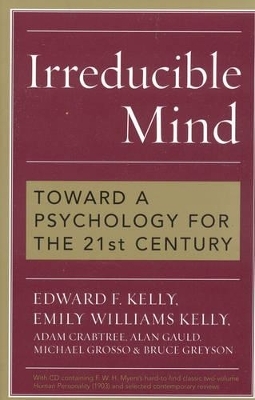
Irreducible Mind
Rowman & Littlefield Publishers
978-0-7425-4792-6 (ISBN)
- Titel ist leider vergriffen;
keine Neuauflage - Artikel merken
Current mainstream opinion in psychology, neuroscience, and philosophy of mind holds that all aspects of human mind and consciousness are generated by physical processes occurring in brains. Views of this sort have dominated recent scholarly publication. The present volume, however, demonstrates_empirically_that this reductive materialism is not only incomplete but false. The authors systematically marshal evidence for a variety of psychological phenomena that are extremely difficult, and in some cases clearly impossible, to account for in conventional physicalist terms. Topics addressed include phenomena of extreme psychophysical influence, memory, psychological automatisms and secondary personality, near-death experiences and allied phenomena, genius-level creativity, and 'mystical' states of consciousness both spontaneous and drug-induced. The authors further show that these rogue phenomena are more readily accommodated by an alternative 'transmission' or 'filter' theory of mind/brain relations advanced over a century ago by a largely forgotten genius, F. W. H. Myers, and developed further by his friend and colleague William James. This theory, moreover, ratifies the commonsense conception of human beings as causally effective conscious agents, and is fully compatible with leading-edge physics and neuroscience. The book should command the attention of all open-minded persons concerned with the still-unsolved mysteries of the mind.
Edward F. Kelly is currently Research Professor in the Department of Psychiatric Medicine at the University of Virginia. He is author of Computer Recognition of English Word Senses and Altered States of Consciousness and Psi: An Historical Survey and Research Prospectus. His central long term interests revolve around mind-brain relations and functional neuroimaging studies of unusual states of consciousness and associated cognitive phenomena. Emily Williams Kelly is currently Research Assistant Professor in the Department of Psychiatric Medicine at the University of Virginia. Adam Crabtree is currently on the faculty of the Centre for Training in Psychotherapy, Toronto. Alan Gauld is a retired Reader in Psychology, School of Psychology, University of Nottingham, as well as past president of the Society for Psychical Research. Bruce Greyson is the Chester F. Carlson Professor of Psychiatry and director of the Division of Perceptual Studies at the University of Virginia. Michael Grosso, though nominally retired, is currently teaching at the University of Virginia’s School of Continuing Education. He is currently a director of the American Philosophical Practitioner’s Association and Review Editor of the Journal of Philosophical Practice.
Chapter 0 Introduction Chapter 0 Preface and Acknowledgements Chapter 1 A View from the Mainstream: Contemporary Cognitive Neuroscience and the Consciousness Debates: - A compact history of 20th-century psychology from behaviorism to present-day cognitive neuroscience, emphasizing the inability of these theories to account fo Chapter 2 F. W. H. Myers and the Empirical Study of the Mind-Body Problem: - An introduction to Myers, an important but neglected figure in 19th-century psychology whose work supports the view that mind is not generated by the brain but instead limited and constrai Chapter 3 Psychophysiological Influence: - A review of numerous phenomena such as placebo, stigmata, and hypnotic suggestion that demonstrate the influence of mental states on the body. Beginning with phenomena now generally accepted because they appear compatible Chapter 4 Memory: - A critique of "trace" theories of memory, which have been taken as axiomatic by generations of psychologists and neuroscientists but are fraught with profound empirical and conceptual difficulties including those posed by a substantial body of w Chapter 5 Automatism and Secondary Centers of Consciousness: - An examination of phenomena such as automatic writing and multiple personality that involve conscious psychological processes occurring outside, and often simultaneously with, ordinary waking consciousn Chapter 6 Unusual Experiences Near Death and Related Phenomena: - An overview of near-death experiences, out-of-body experiences, apparitions and deathbed visions, and related phenomena, emphasizing near-death experiences that occur under general anesthesia or duri Chapter 7 Genius: - A discussion of the importance and challenge of genius level creativity for scientific psychology, emphasizing the need to move beyond pathologizing and to situate genius within an adequate general theory of human mind and personality Chapter 8 Mystical Experience: - An overview of psychological and physiological dimensions of this large and humanly vital — but scientifically neglected - family of "ecstatic" states of consciousness, which sometimes occur spontaneously or in response to psychede Chapter 9 Toward a Psychology for the 21st Century: - Having argued throughout for an enlarged scientific psychology that returns to psychology's great central problems and addresses the mind-body problem empirically, the authors conclude by showing that the theore Chapter 10 About the Authors Chapter 11 References Chapter 12 Appendix: An Annotated Introductory Bibliography of Psychical Research
| Erscheint lt. Verlag | 7.12.2006 |
|---|---|
| Verlagsort | Lanham, MD |
| Sprache | englisch |
| Maße | 161 x 235 mm |
| Gewicht | 1220 g |
| Themenwelt | Geisteswissenschaften ► Psychologie |
| ISBN-10 | 0-7425-4792-2 / 0742547922 |
| ISBN-13 | 978-0-7425-4792-6 / 9780742547926 |
| Zustand | Neuware |
| Haben Sie eine Frage zum Produkt? |
aus dem Bereich


